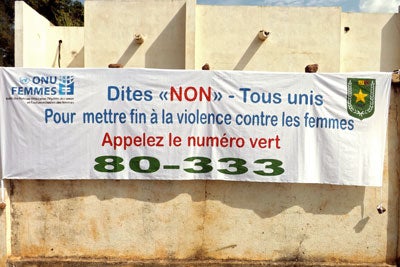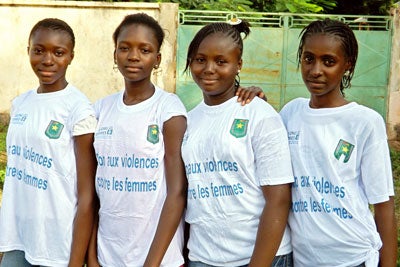Hotline helps prevent gender-based violence in Mali
Date:
Mr. X says his four-year-old niece was able to escape an act of sexual violence thanks to a hotline set up by UN Women in partnership with the National Police.

At 7.05 p.m. on 27 May 2015, Control Centre operators received a call from Municipality I in the district of Bamako, reporting the suspected rape of a four-year-old girl. Mr. X confirmed that police officers arrived less than 15 minutes later to arrest the suspect, an alleged serial rapist. Mr. X praised the medical attention his niece received, which included an examination that suggested acts of sexual touching had taken place, but no rape.
While the worst was avoided in this situation, sadly this is not the case for thousands of other Malian women and girls who experience gender-based violence. Five hundred and seventy-five cases of physical abuse of women were reported in 2005 and 1,002 in 2009, according to Mali’s Association of Battered Women—statistics recorded in a situation of relative peace.
However, it is well-known that conflict increases the risk of violence against women and girls. The use of sex as a weapon war is one of the main manifestations of violence of this type in conflict zones. According to UNFPA, 30 per cent of girl refugees are raped in humanitarian crisis situations during their flight from their home, camp or en route to their host country. In Mali, which is emerging from an armed conflict that has lasted over three years, 3,300 cases of gender-based violence, including 321 cases of sexual violence and 353 cases of physical violence were reported in 2013 by the dedicated Sectoral group and UNFPA.

“Peace is essential to begin recovery and growth, but this cannot be to the detriment of women,” said Maxime Houinato, UN Women Representative in Mali. “We must all work to punish, with no statute of limitations, the crimes they have suffered and continue to suffer.”
To provide appropriate measures to combat and prevent gender-based violence in Mali and, in particular, to reduce the risk of this calamity escalating during crisis and post-crisis situations, UN Women—working in partnership with the National Police of Mali—decided to open a hotline to provide support for women and girls experiencing gender-based violence.
In operation since March 2014, the Control Centre provides services for the attention, support and care for gender-based violence survivors. Its flagship product is the 80333 free hotline available country-wide and around the clock. Operated by police officers, it fields emergency calls and reports of gender-based violence in Mali. The initiative is the result of the partnership established in 2013 between UN Women and Mali’s National Police, financed by the Kingdom of the Netherlands as part of the “Programme for Women and Girls affected by the Crisis, their Rehabilitation and Full Participation in Peacebuilding”.

“The Freephone number is a tool that will help the Government of Mali in its efforts to combat gender-based violence and support victims … a battle that we have been waging for a long time,” said Touré Yaba Tamboura, Gender Advisor to the Minister for the Promotion of Women and Children.
A total of 506 cases of gender-based violence were reported at the Centre between March and December 2014 and another 330 cases from January to August 2015. Police Inspector Broulaye Traoré, Acting Director of the Centre, says the vast majority of calls are from women.
Emergency calls are immediately passed on to the police station nearest to the victim for appropriate investigation and judicial procedures. Situations are also often referred to another partner, the Association for the Defence of Women's Rights in Mali (APDF), which UN Women has been supporting since 2013. It provides holistic support to survivors of gender-based violence, including legal assistance and economic reintegration through income-generating activities.
To ensure the quality of the care and service provided by operators, UN Women places particular emphasis on training police officers and hotline operators, their supervisors and other professionals involved in gender concepts and gender-based violence. Operators have suggested increasing the channels awareness-raising activities because they believe the numbers of calls received do not fully reflect the extent of this scourge in the country.
As well as the Bamako Centre, four other centres have been established in the country, in the central region of Mopti, in Sikasso in the south, and in the northern regions of Gao and Timbuktu.
Related links:
Helping rape survivors in Mali to speak up